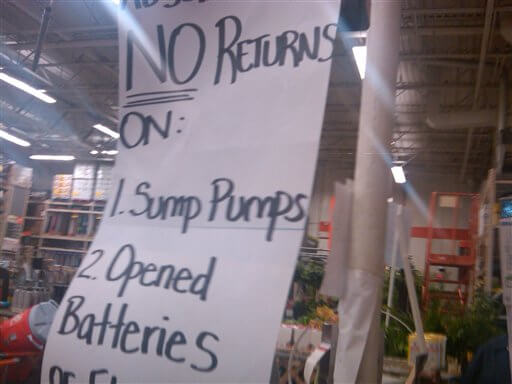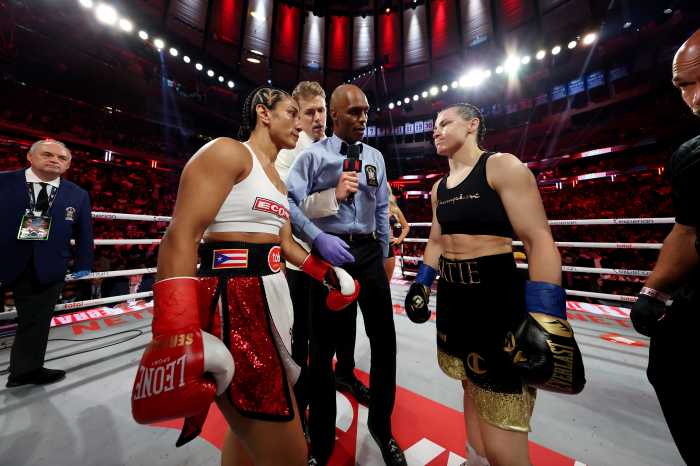
People along the East Coast gave thanks when the storm passed by Sunday and inflicted relatively little harm. But by Monday morning, they were complaining.
Some were annoyed that they’d braved long lines to buy batteries and canned goods that they didn’t end up needing. Others were in stores demanding refunds on the extra flashlights, tarps and even junk food they’d snapped up. Many were planning to host post-hurricane parties to get rid of all the extra food they bought, or were preparing to sell their unwanted stuff on eBay.
Hurricane Irene, which barreled through the Carolinas and the Eastern Seaboard, has exposed the new thriftiness Americans have adopted during the economic downturn. In previous years, people might have just stuffed the extra emergency supplies into their cupboards. But stagnant wages, high unemployment and a volatile stock market have turned spenders into penny pinchers. And many people are having buyer’s remorse.
David McDuff stood in the returns line at a Home Depot in Falls Church, Va., on Monday, waiting to get his money back for the $500 gas-powered generator he’d bought in case he lost power over the weekend.
In years past, McDuff said, he might have been tempted to keep the generator. But now? “I just feel like I don’t need it,” said McDuff, 55, a contractor. “I’ll buy it again if the need arises.”
So far, Hurricane Irene gave an unexpected windfall to home-improvement chains and grocers and a blow department and clothing stores. Stores aren’t eager to give back those sales, but they also don’t want to alienate their shoppers by being difficult to deal with.
At a Home Depot in Brooklyn on Monday, a handwritten sign warned there would be “NO Returns” on sump pumps, opened batteries or flashlights. Both Home Depot and rival Lowe’s say on their websites that customers can return most items within 90 days of purchase. But Karen Cobb, a spokeswoman for Lowe’s, said the store hadn’t seen a rash of returns Monday.
“There are people who still don’t have power,” Cobb says, “and we also know that hurricane season is not over yet, and customers in the Northeast know full and well that there are snowstorms coming.”
Emergency-preparedness professionals agree that people should hold onto their supplies for future need. “At the next storm, rather than trying to beat the crush of people running out to get those things, you can sit back and be safe and comfortable with your family, knowing you already have those things on hand,” said Heather Paul, a spokeswoman for State Farm Insurance.
But some people just don’t see the need in keeping things they don’t plan to use right away.
Alexis Beene of Harlem is wondering what to do with the $150 worth of food and other items she bought to prepare for her “Hurricane Slumber Party” on Saturday night. She wanted her 12 guests to be prepared for every scenario, so she bought peanut butter, four big bottles of wine, a 24-pack of 1-liter water bottles, a 36-variety pack of crackers and 48 double-A batteries. Irene __ and the party __ has come and gone. But most of the items are still taking up space in Beene’s home.
“I guess we’ll be eating a lot of snacks and wine every day,” said Beene, a 28-year-old research analyst.
Beene thinks most of her purchases were prudent, though she acknowledges the batteries may have been a stretch since she doesn’t “even have anything that’s battery-operated” besides one flashlight. She also bought at least a dozen candles so her two-story unit would be well-lit if the electricity went out. She now says she has no use for them, so she resorted to a little begging.
“I was trying to give them away,” she said. “I was telling everyone, ‘Before you leave, please take a candle.'”
Toyya Meyers was glad she’d stocked up on bottled water, but she was annoyed that she had such a hard time finding batteries during Friday’s mad shopping scramble. She ended up paying $3 each for “D” batteries for an electric lantern, which she didn’t need because her electricity never went out.
“I spent $20 or $30 on batteries — I could have spent that on shoes or a bag,” joked Meyers, 34, who works in human resources for a Manhattan law firm. “Maybe I’ll sell them on eBay.”
While some people tried to figure out what to do with all the extra stuff, many people were focused more on what they did not want to do with it. Some joked that Irene was just a conspiracy to boost grocery store sales. They lamented the detrimental effects that buying so many snacks would have on their waist lines.
Brenda Cooper went an extra step and returned her food pre-emptively. Cooper, 51, a secretary, took a shopping bag filled with canned nuts, chocolates and cookies into a Duane Reade in Manhattan on Saturday, before Irene hit. She had purchased them the day before.
“I’m afraid,” she said, “I’m going to overeat.”
Carol Schneider, spokeswoman for the Food Bank for New York City, was pleasantly surprised by a posting on the New York blog Gothamist urging people to donate their “surplus ‘freak out food'” to the bank.
Schneider said the Food Bank, which supplies soup kitchens and other charities throughout the city, would take whatever people had left over, even if it was just a couple of cans of tuna fish or boxes of cereal. As of Monday evening, the Food Bank had seen no Irene-induced surge of donations, but Schneider was hopeful they would come after people sorted out more immediate problems like flooded basements.
“Whatever is extra and they’re not going to use — everything helps,” she said. “Especially in times like these.”
——-
AP staffers Ellen Gibson and Anne D’Innocenzio in New York and Derek Kravitz Washington, D.C. contributed to this report.
Copyright 2011 The Associated Press.



































